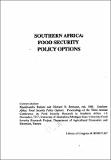| dc.contributor.author | Amani, H.K.R. | |
| dc.contributor.author | Kapunda, S.M. | |
| dc.contributor.author | Lipumba, N.H.I. | |
| dc.contributor.author | Ndulu, B.J. | |
| dc.coverage.spatial | Tanzania | en |
| dc.date.accessioned | 2016-06-08T13:55:35Z | |
| dc.date.available | 2016-06-08T13:55:35Z | |
| dc.date.issued | 1988 | |
| dc.identifier.citation | Amani, H.K.R. et al., (1988) Effects of market liberalization on food security in Tanzania. In: Rukuni, M. and Bernsten, R.H. (eds.) Southern Africa: Food Security Policy Options. Proceedings of the Third Annual Conference on Food Security Research in Southern Africa. 1-5 November, 1987. Harare: University of Zimbabwe/Michigan State University Food Security Research Project, pp. 65-101. | en |
| dc.identifier.uri | https://opendocs.ids.ac.uk/opendocs/handle/20.500.12413/11646 | |
| dc.description | A conference paper on the effects of market liberalization on food security in Tanzania. | en |
| dc.description.abstract | During the past decade, Tanzania has faced an unprecedented economic crisis, characterised by severe balance of payments disequilibrium, high inflation, and large government budget deficits. Population has grown more rapidly than gross domestic product. Shortages of consumer goods were widespread and intermittent food shortage had to be met by food imports.
To tackle the economic crisis, government implemented several adjustment and stabilization programmes (Ndulu and Lipumba, 1986). These policies culminated in significant devaluation and the liberalization of imports financed by privately-owned foreign exchange. Restrictions on private trade b food grains were relaxed. In June 1986, the government adopted the World Bank and IMF-supported Economic Recovery Programme (ERP). The policy measures taken included a major devaluation and a crawling peg to correct future overvaluation, control of the growth of government expenditures to reduce and limit government borrowing from the banking system, increases in agricultural producer prices, and further relaxation of restrictions on private trade in major food grains. The policy thrust has been to adopt market-oriented policy instruments and to depend less on state-controlled procedures. Since 1984 government has further liberalized the economy. | en |
| dc.description.sponsorship | The research supporting the preparation the proceedings papers was financed by the U.S. Agency for International Development, Bureau of Science and Technology; Bureau for Africa; and the Southern Africa Regional Programme; | en |
| dc.language.iso | en | en |
| dc.publisher | University of Zimbabwe (UZ) Publications/ Michigan State University (MSU) | en |
| dc.rights.uri | http://creativecommons.org/licenses/by-nc-nd/3.0/ | en |
| dc.subject | Economic Development | en |
| dc.title | Effects of market liberalization on food security in Tanzania | en |
| dc.type | Book chapter | en |
| dc.type | Conference paper | en |
| dc.rights.holder | University of Zimbabwe (UZ), Department of Agricultural Economics & Extention (DAEE) | en |


